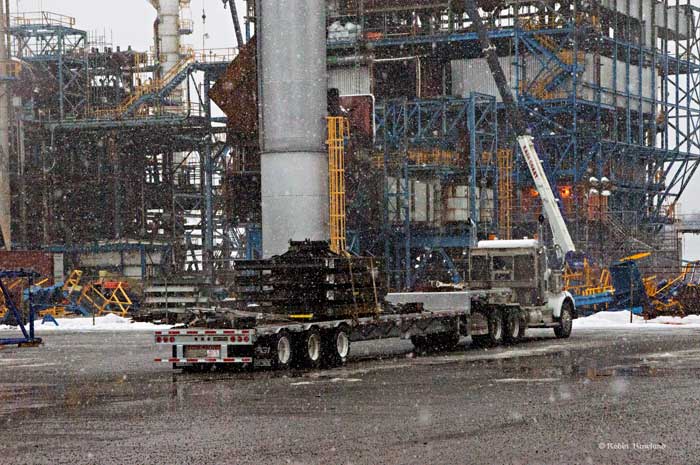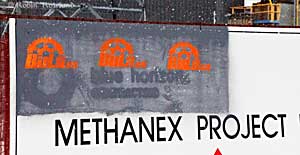On the same day:
- In Davos, Prime Minister Stephen Harper told the World Economic Forum that his government consider it a “national priority” to ensure the country has the “capacity to export our energy products beyond the United States, and specifically to Asia…In this regard, we will soon take action to ensure that major energy and mining projects are not subject to unnecessary regulatory delays — that is, delay merely for the sake of delay.” (See Globe and Mail Harper vows ‘major transformations’ to position Canada for growth)
- The New York Times in In China, Human Costs Are Built Into an iPad exposes the horrendous, almost slave like conditions in China’s dark satanic mills that create and polish the shining iPads (that probably millions actually to use to read the Times.)
- In The Ottawa Citizen, Terry Glavin writes Questions Canadians should be asking about China. The University of Victoria journalism professor takes a hard look at the growing power around the world of Sinopec, the Chinese state petroleum company, one of the biggest backers of the Northern Gateway pipeline, saying that “Sinopec became co-author of Stephen Harper’s new foreign policy and energy strategy.”
- In the Vancouver Sun, Mark Jaccard, of Simon Fraser university, takes a wider view of the Northern Gateway pipeline and its effect on greenhouse gas emissions in Pipeline itself not the only problem we should worry about and also questions the role of China in oil sands and pipeline development.
- A quiet rumour has been heard more and more in Kitimat for the past month, that China, not Enbridge, will build the Northern Gateway pipeline, bringing in thousands of Chinese workers, living in work camps for the pipeline construction.
You hear a rumour once, it’s just a rumour, not worth reporting.
You hear it three or more times; a couple times in quiet conversation with different people, then overhear it in a Shoppers Drug Mart lineup, it means that rumour, unlikely, in fact far fetched, as it would be in reality, shows that the pipeline debate is touching a raw nerve in northwestern British Columbia.
On its surface, the rumour could never be correct, Canada would never agree (as this country did when building the railways more than a century ago) to bring in thousands of Chinese workers to build the pipeline across the British Columbia wilderness.
On the other hand, one thing fuelling the rumour is that when China invests in other countries, often there are compounds full of workers and managers from China, who capture the best jobs in a project, leaving the low-level work to local labour. The media has reporting Chinese abuse of workers in Africa for the past few years. The latest in The Guardian on January 2, 2012, reported Workers claim abuse as China adds Zimbabwe to its scramble for Africa
Underlying the rumour is fear, fear of further loss of jobs to China.
In northwestern BC, the saw mills are closing, while raw logs are shipped to China. Each day CN hauls huge coal trains (coal, of course, one of the greatest contributors to greenhouse gases) to the port of Prince Rupert, returning with intermodal trains, averaging 170 cars, with containers full of cheap Chinese made goods destined mostly for the United States.
According to new poll, published in The Calgary Herald, 84 per cent of Albertans want the bitumen upgraded in the province. (Marc Henry The politics of upgrading Alberta bitumen )
At the same time, the Harper government continues to demonize the environmental objections to the Northern Gateway pipeline, which leads at least one columnist on The Calgary Herald, Stephen Ewart, to say Northern Gateway pipeline debate could stand better diplomacy quoting Natural Resources Minister Joe Oliver as saying
“You wouldn’t hear from American special interest groups, celebrity environmentalists and champagne socialists that Canada’s oilsands are subject to the toughest environmental monitoring and regulation in the world,” Oliver said.
Ewart, who is pro-pipeline, goes on to say:
Canada needs an export pipeline to a location on the West Coast to sustain the economic impact on the national economy from oilsands development. What isn’t needed is more antagonistic comments from government ministers.
It will likely take a lot more than diplomatic niceties to calm the pipeline controversy.
The one promise from Enbridge, the Alberta bitmen sands and the Harper government that may have some traction in northwestern British Columbia is tens of thousands of temporary construction jobs. It is well known that there will be very few permanent jobs from the Northern Gateway pipeline in this part of Canada.
Now it appears that some people here in the northwest are starting to believe there won’t even be construction jobs along the Northern Gateway pipeline.
The Calgary oil-patch, who today cheered Environment Minister Peter Kent when he said he would fast track the regulatory process for energy development, should take note, the rumour about vast compounds of Chinese workers building a pipeline through the BC bush is not coming from “champagne socialists” but from working people who want solid, good, long-term, well-paying jobs. These are people who also fish, hunt, hike and boat and are worried about the environmental impact of the pipeline and trying to balance jobs and the environment.
The campaign against “foreign” environmentalists, fronted by Ezra Levant and Ethical Oil but likely originating in the inner circles of the Conservative political war room, may be backfiring.
Raise the question of foreign interference and that incites all kinds of political rumours, rumours unintended in the political bubble just inside the Ottawa Queensway.
The China worker rumour appears to have started just a short while after Ethical Oil’s campaign against the foreign environmentalists began to attract widespread media attention.
 The China worker rumour doesn’t come from the political commentary set who published columns today, but from the coffee shops, drug store lineups and Legion Halls.
The China worker rumour doesn’t come from the political commentary set who published columns today, but from the coffee shops, drug store lineups and Legion Halls.
The China worker rumour shows a lack of trust in northwestern BC for Enbridge, for Sinopec, for the province of Alberta, for the Harper government.
As far fetched as the rumour is, the idea that Chinese workers will build the pipeline can only escalate the controversy over the Northern Gateway pipeline.
 An editorial published today by the president of the Asia Pacific Foundation of Canada says that the media concentrating on Prime Minister Stephen Harper’s trip to Beijing has it wrong, the key to the relationship between Canada and China is in Kitimat, not Beijing.
An editorial published today by the president of the Asia Pacific Foundation of Canada says that the media concentrating on Prime Minister Stephen Harper’s trip to Beijing has it wrong, the key to the relationship between Canada and China is in Kitimat, not Beijing.


